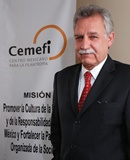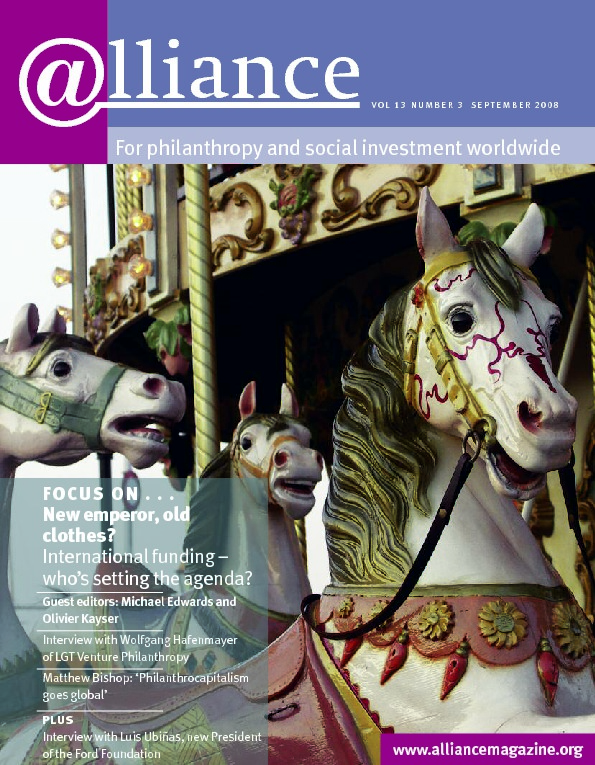 CEMEFI – the Centro Mexicano para la Filantropía (the Mexican Center for Philanthropy) began celebrating its 20th anniversary last November with its 12th Annual Meeting in Mexico City under the title Progress and Challenges for Mexico’s Solidarity. Over 1,000 people from across the country attended, representing foundations, civil society organizations (CSOs), socially responsible companies and various government entities.
CEMEFI – the Centro Mexicano para la Filantropía (the Mexican Center for Philanthropy) began celebrating its 20th anniversary last November with its 12th Annual Meeting in Mexico City under the title Progress and Challenges for Mexico’s Solidarity. Over 1,000 people from across the country attended, representing foundations, civil society organizations (CSOs), socially responsible companies and various government entities.
Mexico’s President Felipe Calderón opened the meeting, while his wife, Margarita Zavala, presided over the Recognition of Commitment to Others awards ceremony and the leaders of Mexican civil society sat as plenary panellists in 24 concurrent sessions and eight workshops.
During the three-day meeting one found in the hallways of Polanco’s Camino Real Hotel not only various foundation colleagues but also businessmen, public officials, academics and journalists sharing and discussing ideas. Twenty years ago, such an event would have been unimaginable. It shows the significant change that has occurred in how Mexico values the role of foundations, and the organized participation of citizens and philanthropy in the development of the country. Compare this situation with the conditions under which CEMEFI was born, and we can understand the crucial role it has played during its 20 years of existence.
Origins of CEMEFI
On 8 December 1988, the Mexican businessman and philanthropist Manuel Arango founded and registered a new Mexican civil association under the name Mexican Center for Philanthropic Organizations. Three years later, in 1991, an assembly of founding partners, all recognized leaders in business and society, convened to refound the organization and changed the name to the Mexican Center for Philanthropy to emphasize the role of strategic promotion. They approved new statutes, a new institutional image and the appointment of a professional staff of five.
With social and political spirits running high, but with many official obstacles to the work of CSOs, CEMEFI emerged in a very short time as a reference point in the social sector, both for its vision and commitment and for its work in promoting the public relevance and recognition of civil society.
CEMEFI began at a moment of tremendous social dynamism in Mexico. In 1985, a strong earthquake shook Mexico City, leaving hundreds of buildings destroyed and thousands dead. This crisis was also a symbolic moment that revealed great solidarity among Mexicans and their capacity to take action in the face of tragedy when the government was overwhelmed by the situation.
In those years, also for the first time in Mexico, an opposition party came into government. Mexico had spent more than a decade attempting to become a more open and participatory democracy capable of addressing major national problems, especially poverty and the lack of opportunities suffered by over half of the population. Citizen participation urgently needed to be strengthened, while the country kept working towards democracy and opened up institutional paths to support solutions to national problems put forward by citizens and the private sector.
The country had over 80 million inhabitants in 1980, and only around 1,000 CSOs authorized to give tax-deductible receipts. Eighty per cent of those were dedicated to social assistance activities. Of the remaining CSOs, three times greater in number, the majority were not officially authorized but had nevertheless achieved a significant public presence. This last group, dedicated to community development, human rights, protecting the environment, civic education, public health and education, was financed by European and North American foundations; the government was frankly distrustful of their work. The very mention of the term ‘civil society’ was enough to make officials feel ill.
Today the situation has improved, but many challenges remain: although around 20,000 CSOs now exist in Mexico, only 6,400 can give tax-deductible receipts. Of those, only around 300 are grantmaking foundations. The numbers have risen, but they are still low for a country of 105 million inhabitants. The promotion of CSOs continues to be a great challenge.
The development of CEMEFI
In establishing its mission, ‘to promote and give form to the dedicated, socially responsible philanthropic participation of citizens and their organizations to achieve a more equitable, united and prosperous society’, CEMEFI embarked on a project to change the culture of the country.
From the beginning, it proposed a new social vision in which the actions of organized citizens, working critically and autonomously in all public fields, would complement the government’s actions. It also postulated the existence of an organized civil society as an indispensable condition for achieving a modern participatory democracy.
In 1991, with the support of the Kellogg Foundation, CEMEFI organized a series of seminars at the Iberoamerican University bringing together representatives from each sector to analyse social problems and the role of the different sectors in addressing them. It was the first attempt to establish alliances, at a moment when civil society, business and government interacted rather like oil and water.
CEMEFI’s objectives were
- to collaborate to maximize civil society’s contribution to social development and well-being;
- to obtain and disseminate information about institutions, groups and people dedicated to philanthropic activities;
- to professionalize the organization and work of CSOs;
- to implement financial mechanisms that permit the flow and maximization of funds to philanthropic projects.
To translate these into concrete actions, five programmes were defined in 1992: Research, the Directory of Philanthropic Institutions, Communications, Institutional Development and International Relations. The programmes have since evolved into eight strategic areas, each with its own programmes and operating strategies. CEMEFI now has a staff of 30 people and over 700 members, among which are grantmaking foundations, non-profit organizations, businesses, universities, individuals, and even some government entities.
CEMEFI’s first task was getting to know Mexico’s philanthropic sector. It compiled a Directory of Philanthropic Institutions (including information about non-profit organizations and grantmaking foundations) and launched a study comparing philanthropy in Mexico and the US in three key areas: legal and fiscal framework, sources and amounts of operating resources, and the professional level of organizations. The results of the study, entitled Mexican Philanthropy: Diagnostics and proposals, defined the three major areas of work for CEMEFI. These three areas of action remain applicable even after two decades of work.
CEMEFI’s key achievements
CEMEFI’s most important achievement is perhaps its very existence, with more than 700 members that support its mission. It has reached a good level of sustainability through the membership dues as well as national and international contributions, and its annual meeting is now a reference point for the sector. The Directory of Philanthropic Institutions now lists over 10,000 registered institutions.
Other notable achievements include the promotion of a philanthropic culture in Mexico via the programme Mira por los Demás (Looking Out for Others); the promotion of volunteerism via the website http://www.hacesfalta.org.mx; the creation of highly publicized awards for exemplary philanthropic activities and socially responsible businesses; the creation in universities of degrees, courses and training workshops for non-profit professionals and volunteers; advocacy for a new legal framework for the sector, culminating in the ratification of the Federal Law of Support for Activities of Non-profit Organizations; and the introduction of over 30 fiscal provisions that provide incentives for non-profit organizations, such as income tax exemptions for environmental organizations and local tax exemptions in Mexico City.
Challenges for the future
Challenges remain, however. Citizens’ awareness of and enthusiasm for social participation still needs to be increased. In spite of measures like the creation of the CSR Distinction (Distintivo ESR) for socially responsible businesses, corporate social responsibility still needs to be strengthened in Mexico. There should be more CSOs and more grantmaking organizations. Finally, the amount and transparency of government resources dedicated to the organized citizen sector needs to be increased.
CEMEFI is indebted to the generosity of many who have participated in its development, sharing their talents and resources. These first 20 years are a starting point for strengthening citizens’ commitment and the conviction that what we do for others builds a better world for everyone.
Jorge V Villalobos Grzybowicz is Executive President of the Mexican Center for Philanthropy (CEMEFI). Email jorge@cemefi.org
For more information
http://www.cemefi.org





Comments (0)